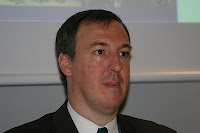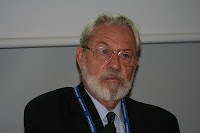-
Dispatches From the World Conservation Congress: Geoff Dabelko on Wartime Environmental Protection, Post-Conflict Peacebuilding
October 8, 2008 By Geoffrey D. Dabelko The lawyers are out at the World Conservation Congress Forum in Barcelona. Carl Bruch of the Environmental Law Institute in Washington, DC, was one of several speakers at “Armed Conflict and Environment: Protecting the Environment During War and Improving Post-Conflict Natural Resource Management.”
The lawyers are out at the World Conservation Congress Forum in Barcelona. Carl Bruch of the Environmental Law Institute in Washington, DC, was one of several speakers at “Armed Conflict and Environment: Protecting the Environment During War and Improving Post-Conflict Natural Resource Management.”
Bruch is leading a forward-leaning initiative entitled “Strengthening Post-Conflict Peacebuilding and Recovery Through Natural Resource Management” that is collaborating with Tokyo University and the UN Environment Programme’s Conflicts and Disasters Programme to analyze cases from around the world where the environment is key to causing, extending, ending, or recovering from conflict. Bruch and his team of authors are trying to glean lessons for peacebuilding by examining natural resource management in post-conflict societies. Bruch emphasized that the goal is to provide actors on the ground who are not environmental practitioners with the practical means to integrate natural resource management into their operations. Michael Bothe, an expert on the environment and laws of war from Goethe University in Frankfurt, Germany, suggested IUCN could play a positive role in using the parks-for-peace process to establish parks as demilitarized zones. He noted that peacetime treaties often remain in effect in times of conflict, but that obligations in international environmental treaties are promotional and therefore have limited impact during war. Bothe called for more work in three areas:
Michael Bothe, an expert on the environment and laws of war from Goethe University in Frankfurt, Germany, suggested IUCN could play a positive role in using the parks-for-peace process to establish parks as demilitarized zones. He noted that peacetime treaties often remain in effect in times of conflict, but that obligations in international environmental treaties are promotional and therefore have limited impact during war. Bothe called for more work in three areas:- Passing laws that use parks-for-peace mechanisms to prevent valuable habitats from becoming military objectives;
- Clarifying how the military doctrine of proportionality of response applies to environmental damage; and
- Specifying the application of customary (i.e., traditional) law regarding environmental protection during armed conflict.
Illustrating the diversity of participants at the World Conservation Congress, questioners from Iraq, Lebanon, Pakistan, Angola, Georgia, and Germany focused on environmental damage from conflicts in their regions.
- Passing laws that use parks-for-peace mechanisms to prevent valuable habitats from becoming military objectives;
 A Publication of the Stimson Center.
A Publication of the Stimson Center.

 The lawyers are out at the
The lawyers are out at the  Michael Bothe, an expert on the environment and laws of war from Goethe University in Frankfurt, Germany, suggested
Michael Bothe, an expert on the environment and laws of war from Goethe University in Frankfurt, Germany, suggested 

